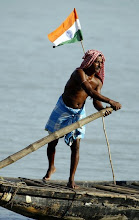In a multilingual,multi cultural democratic set up like India,voting behaviour is dictated by a plethora of complex issues.From time and again it has been proved that political parties in India can not rely upon any particular factor to win the trust and confidence of the voters.Such is the complex nature of the voting behavior that even the best of the psephologists or social scientists or even genius politicians failed to read public psychology on numerous occasions.Below is a summary of the determinants of such perplexing electoral psychology.
Caste has been an important factor in Indian politics.Though recent trends show that its impact is more prominent in the state level politics,it plays a crucial role in shaping up the policy of the governments.Wooing a specific caste has been the principal agenda of many a politicians.This has been a retrogressive character of Indian politics and has so far been playing a divisive role.
Religion is another pull down factor of Indian electoral politics.Rather than uniting people,religion has mostly divided India into many watertight compartments.Fundamentalists have taken political mileage of the situation by wooing people belonging to a specific religion and infused the poison of communalism in the electoral psychology.
Regionalism has been a key determinant of Indian voting behaviour since 1990s.Demanding separate state,promoting region specific interests have been the strategies of politicians to capture the vote bank.This has bred separatism and endangered intyernal security of the country.
Language is another important factor in this regard.Although its impact is not prominet in state level politics, in the national level it has played a key role.Dividing India into Hindi and non Hindi belts is an unfortunate outcome of this.
Hero worshipping is another popular trend in India psephology.On numerous occasions political parties have tried to capture popular sentiment by using charisma of their leaders.Therefore many political parties of India today are leader based rather than being ideology based.
Ideology has been a key factor in Indian politics.Communism is a glaring example of this and though recent trends show some changes, Bengal,Tripura,Kerala have long been communist strongholds.
Some important or sudden events or incidences can change the voting behavior as well as political equations.The proclamation of emergency was one such incidence which resulted in the then Congress government being toppled by the Janata Party in 1977.
Development works in the most silent yet the most effective manner in determining the popular mandate in elections in India.Developmental slogans like"Roti,Kapda, Makan" ,"Garibi Hathao","Bijli,Sadak,Pani" have long been used to attract the attention of the people.
Apart from the above mentioned factors, race,anti incumbency factor,terrorism etc have been the other determinants.However it must be noted that many a times a number of factors work in tandem to shape up the popular electoral opinion, thus making it further difficult for the politicians to make use of the existing situation and thereby producing unpredictable results as has happened in the national level in 2004 or in several states in the recent Lok Sabha Election.
Caste has been an important factor in Indian politics.Though recent trends show that its impact is more prominent in the state level politics,it plays a crucial role in shaping up the policy of the governments.Wooing a specific caste has been the principal agenda of many a politicians.This has been a retrogressive character of Indian politics and has so far been playing a divisive role.
Religion is another pull down factor of Indian electoral politics.Rather than uniting people,religion has mostly divided India into many watertight compartments.Fundamentalists have taken political mileage of the situation by wooing people belonging to a specific religion and infused the poison of communalism in the electoral psychology.
Regionalism has been a key determinant of Indian voting behaviour since 1990s.Demanding separate state,promoting region specific interests have been the strategies of politicians to capture the vote bank.This has bred separatism and endangered intyernal security of the country.
Language is another important factor in this regard.Although its impact is not prominet in state level politics, in the national level it has played a key role.Dividing India into Hindi and non Hindi belts is an unfortunate outcome of this.
Hero worshipping is another popular trend in India psephology.On numerous occasions political parties have tried to capture popular sentiment by using charisma of their leaders.Therefore many political parties of India today are leader based rather than being ideology based.
Ideology has been a key factor in Indian politics.Communism is a glaring example of this and though recent trends show some changes, Bengal,Tripura,Kerala have long been communist strongholds.
Some important or sudden events or incidences can change the voting behavior as well as political equations.The proclamation of emergency was one such incidence which resulted in the then Congress government being toppled by the Janata Party in 1977.
Development works in the most silent yet the most effective manner in determining the popular mandate in elections in India.Developmental slogans like"Roti,Kapda, Makan" ,"Garibi Hathao","Bijli,Sadak,Pani" have long been used to attract the attention of the people.
Apart from the above mentioned factors, race,anti incumbency factor,terrorism etc have been the other determinants.However it must be noted that many a times a number of factors work in tandem to shape up the popular electoral opinion, thus making it further difficult for the politicians to make use of the existing situation and thereby producing unpredictable results as has happened in the national level in 2004 or in several states in the recent Lok Sabha Election.











